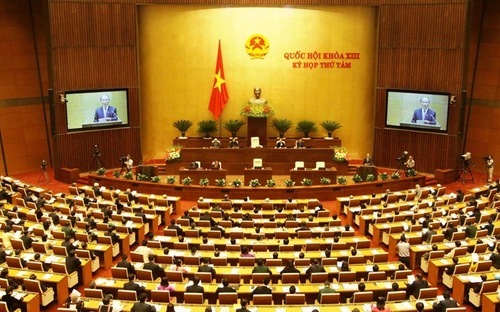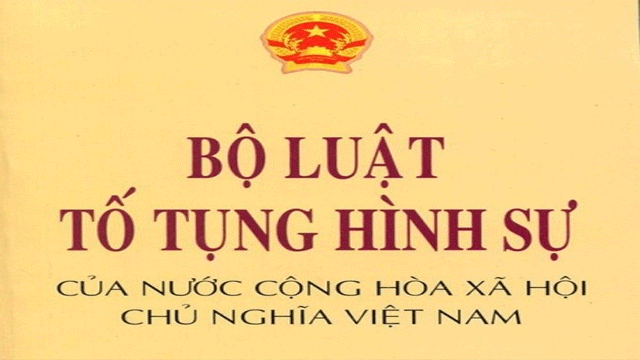Detention is a deterrent measure in criminal proceedings. When this measure is applied, the person held in temporary detention is isolated from society for a certain period of time, having some human rights and rights restricted. citizenship such as the right to freedom of body, residence, movement ...

Detention in criminal proceedings: Cases of detention? Detention period? (Illustration)
1. Cases of detention
According to the provisions of Article 119 of the Criminal Procedure Code 2015 , the accused and defendants may be detained in the following cases:
a) The accused or defendants commit particularly serious crimes or very serious crimes
A very serious crime is a crime of great nature and danger to the society. The maximum penalty frame prescribed by the Penal Code for such crime is from over 07 years to 15 years in prison.
A particularly serious crime is a crime of particularly great nature and danger to the society, for which the maximum penalty bracket prescribed by the Penal Code is over 15 years to 20 years. prison, life imprisonment or the death penalty.
b) The accused or defendants commit serious crimes or less serious crimes for which the Penal Code prescribes a prison term of over 2 years when there are grounds to determine that such person falls into one of the following cases:
-
Other preventive measures have been applied but violated;
-
There is no clear place of residence or the identity of the accused is unknown;
-
Running away and being arrested under a wanted decision or showing signs of fleeing;
-
Continuing to commit crimes or showing signs of continuing to commit crimes;
-
Having acts of bribing, coercing or inciting others to make false statements or provide untruthful documents; destroy or forge evidences, documents and objects of the case, disperse assets related to the case; threaten, control and retaliate against witnesses, victims, crime whistleblowers and their relatives.
A serious crime is a crime of great nature and danger to society, for which the maximum penalty frame prescribed by the Penal Code is from over 3 years to 07 years in prison.
A less serious crime is a crime with a nature and level of danger to society that is not great, but the highest level of the penalty frame prescribed by the Penal Code for such crime is a fine, non-custodial reform. or imprisonment for up to 3 years.
c) The accused or defendants commit a less serious crime for which the Penal Code stipulates a prison term of up to 2 years if they continue to commit the crime or run away and are arrested under a wanted decision.
d) The accused or defendants who are pregnant or nursing a child under 36 months old, are elderly and weak, or are seriously ill will be detained in one of the following cases:
-
Escaped and was arrested under the wanted decision;
-
Continuing to commit crimes;
-
Having acts of bribing, coercing or inciting others to make false statements or provide untruthful documents; destroy or forge evidences, documents and objects of the case, disperse assets related to the case; threaten, control, take revenge on witnesses, victims, crime whistleblowers or their relatives;
-
The accused or defendants are accused of infringing upon national security and have sufficient grounds to determine that if they are not detained, it will cause harm to national security.
2. Detention period
According to the provisions of Article 173 of the Criminal Procedure Code 2015 , the time limit for temporary detention of the accused for investigation shall not exceed 2 months for less serious crimes, not more than 3 months for serious crimes, and not more than 4 months. for very serious crimes and particularly serious crimes.
In case the case has many complicated details, considering that it takes a longer time for investigation and there are no grounds to change or cancel the temporary detention measure, at least 10 days before the expiration of the temporary detention time limit. In case of detention, the investigating authority must make a written request to the Procuracy to extend the temporary detention period.
-
For less serious crimes, temporary detention may be extended once for no more than 01 month;
-
For serious crimes, temporary detention may be extended once for no more than 2 months;
-
For very serious crimes, temporary detention may be extended once for no more than 3 months;
-
For particularly serious crimes, temporary detention may be extended twice, each time not exceeding 04 months.
In addition, in case of necessity for crimes of infringing upon national security, the Chief Procurator of the Supreme People's Procuracy has the right to extend the extension once for no more than four months. Upon the expiry of such time limit, if the investigation cannot be completed and there are no grounds to change or cancel the temporary detention measure, the Procurator General of the Supreme People's Procuracy may extend the time limit for one more time but for no more than 01 month. for serious crimes, no more than 02 months for very serious crimes, no more than 04 months for particularly serious crimes.
In special cases of particularly serious crimes infringing upon national security without grounds for rescinding the temporary detention measure, the Procurator General of the Supreme People's Procuracy shall decide on temporary detention until the end of the detention period. investigation.
For particularly serious crimes that are not crimes against national security, if deeming it necessary and having no grounds to change or cancel the temporary detention measure, the Procurator General of the Supreme People's Procuracy may the right to extend it one more time but not more than 04 months. In special cases where there are no grounds to cancel the temporary detention measure, the Procurator General of the Supreme People's Procuracy shall decide on temporary detention until the investigation ends.
Jewel
 Article table of contents
Article table of contents





.Medium.png)
.Medium.png)
.Medium.png)
.Medium.png)
